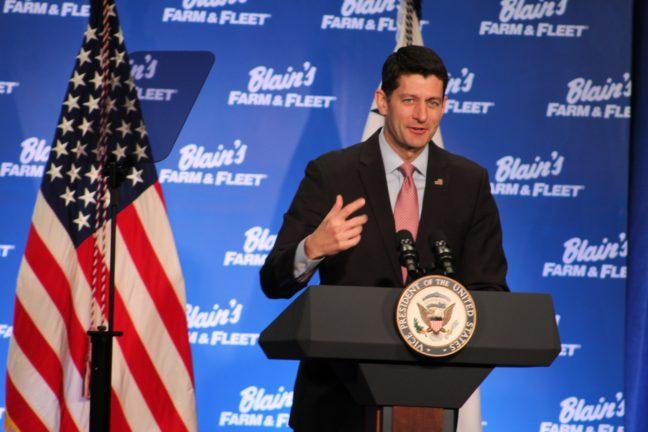Wisconsin Republicans’ golden boy and Speaker of the House Paul Ryan is once again under fire for his deference to President Donald Trump, this time regarding Trump’s proposed tariffs on steel and aluminum imports.
In addition to the threats of a tariff, Trump proposed a retaliatory tax on imported vehicles manufactured in the European Union in response to the EU’s talks of instituting a 25 percent tax on around $3.5 billion of U.S. imports.
Numerous prominent Republican politicians have come out vehemently opposing the tariffs, including chairman of the Finance Committee Sen. Orrin Hatch, R-Uta, normally an ardent supporter of the president. Leaders of the House Ways and Means Committee have already drafted a letter to Trump expressing their concerns about the effects the proposed tariffs would have on the American economy and on international relationships with the European Union. The letter also warns about the possibility of global repercussions if the tariffs were to come into effect.
Ryan himself, however, has publicly remained largely indifferent to the issue, choosing instead to attempt to negotiate behind-the-scenes. In his only public statement regarding Trump’s tariffs, Ryan’s spokesperson said, “[Ryan is] extremely worried about the consequences of a trade war and is urging the White House to not advance with this plan,” continuing on to caution the plan could have a disruptive effect on the supposed gains the economy is seeing following the Republican tax reform.
Known for ruling with a soft hand and praised by fellow Republicans as a politician and leader who is always willing to listen, his Democratic counterparts see Ryan through a much harsher lens. Following in the footsteps of the last Democratic Speaker of the House, Nancy Pelosi, Democrats see Ryan as unable to gain consensus within his own party, let alone across the aisle. With his infamous failure to obtain the necessary 218 votes to pass a long-awaited Republican countermeasure to the Obama administration’s Affordable Care Act, Democrats often question his ability to lead not only the House, but his own party.
Aside from questionable leadership tactics within the House, Ryan has consistently failed to separate himself enough from the disastrous policies of the Trump administration, even when these policies contradict Ryan’s previously stated personal and political beliefs. Ryan has always been an outspoken proponent of free trade, encouraging economic growth through trade deals and the globalization of American “ideals and values” and products.
Even with such a steadfast belief, however, Ryan is seemingly content with a halfhearted statement inserted in the discussion regarding a massive regression of free trade and relations with the European Union. As someone heralded by some within the Republican party as a potential presidential candidate — and as a man who is currently third in line to assume the position in the event of an emergency — it is troubling he is not only unable to lead his peers, but unable even to reconcile his own beliefs with that of the administration.
A man willing to bend over backwards to acquiesce those higher than himself with no concern for his personal values is not a man who belongs in the White House.
In addition to his vacillation on free trade, Ryan has shown in past instances his words of dissent mean little when it comes to truly distancing himself from the Trump administration. Following the release of the Access Hollywood video which shows Trump boasting about sexually assaulting women, Ryan disinvited Trump from a rally in Wisconsin, saying he no longer wished to campaign with him and he was “sickened” by the tape.
Ryan did not go so far as to withdraw support from the Republican candidate, however, and allowed then-Vice Presidential nominee Mike Pence to replace Trump at the rally. Pence’s track record with women, while not including blatant boasting of sexual conquests, does include prolonged assaults on women’s reproductive rights and are egregious in their own right.
The proposed tariffs will undoubtedly be bad for the economy and for the historically-stable and mutually-beneficial relationship between the United States and the European Union. Ryan, along with fellow, much more vocal Republican counterparts, are aware of the damage Trump’s retaliatory measures will have, yet Ryan remains too spineless to publicly work to prevent their implementation.
Facing reelection in fall 2018, Ryan and the sum of his successes and failures as speaker will be picked apart under the public microscope. Democratic challenger Randy Bryce has already used Ryan’s partnership with Trump to his advantage, bashing the speaker for his role in the Trump tax cuts that are predicted to do more harm than good for many middle-class families. While it is unclear whether Ryan’s support of Trump will do him any favors in the polls come November, it is resoundingly clear this relationship is not doing the people of this country any favors.
Aly Niehans (aniehans@badgerherald.com) is a sophomore majoring in political science and intending to major in journalism.


